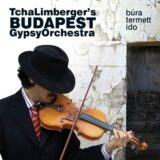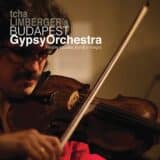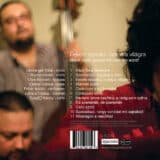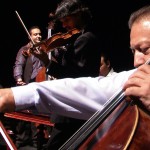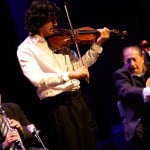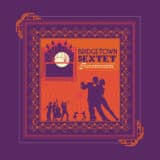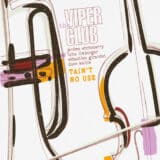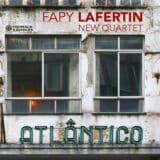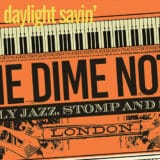Tcha Limberger’s Budapest Gypsy Orchestra
Possibly one of the rarest bands on the scene today
Soaring musical tragedy and czardas madness delivered with an astounding purity of sound and hardly imaginable depth of musical dialogue. An accomplished multi-instrumentalist, Tcha Limberger is from a famous family of Gypsy musicians growing up with the Gypsy-jazz of Django Reinhardt. Now just 40, he tours with this orchestra of hand-picked Gypsy musicians from Budapest where there is no ‘Primas’ who commands such respect.
Csardas, Verbunk and Laments from the Budapest ‘Magyar Nota’ Gypsy orchestra tradition of the 19th and early 20th centuries with the beautiful voice and playing of blind violinist Tcha Limberger and his incredible band!
In Hungarian Gypsy Band style they switch between soaring intensity and smouldering pathos delivering a passion and technical virtuosity that is astounding.
‘About the music I intend to play: to start of with, this music deserves to be re-appreciated in it’s essential form and for that reason I don’t intend to create a new style immediately. It should again be played by musicians who really want to play it. Of course, we will not try to sound like a Gypsy band out of 1920, but also we’ll not play current versions either. I would like to bring all these elements together that made me want to study this music, that still inspire me about this music, even when it seems to be dead already.’
TCHA LIMBERGER
TCHA LIMBERGER – Violin, Vocals
FEHER ISTVAN – Cimbalom
LUKÁCS CSABA – Clarinet
OLAH NORBERT – Brac
RUSZO ISTVAN – Violin
SZEGFU KÁROLY – Cello
VILMOS CSIKOS – Double Bass
BUDAPEST GYPSY ORCHESTRA TRACKLISTS & RECORDINGS
PRESS
ROBY LAKATOS
SUNDAY TIMES UK
THE OBSERVER UK
MOORS MAGAZINE HOLLAND
SONGLINES UK
COMPACT HOLLAND
No Events
Visit Tcha Limberger’s website
REVIEWS
CONCERT REVIEW – The Herald 19.03.2014 Tcha Limberger – Feeling Hungary for music
Tcha Limberger doesn’t do things by halves. When the Belgian-born multi-instrumentalist learns a style of music, he doesn’t just learn the notes – he learns the language of the country that produced the music so that he knows exactly what feelings he should be expressing. And when he plays the music, he follows the dictum learned from clarinettist and soprano saxophone pioneer Sidney Bechet, that music is life or death, with nothing in between.
Limberger’s facility with languages – he speaks six fluently – mirrors his infatuation with a similar number of instruments. Born blind into a family of gypsy musicians, he experienced music in his early years in the same way he breathed in air. It was all around him. His father, Vivi, played guitar in Belgian gypsy jazz group Waso, which also featured Tcha’s guitar playing uncle, Fapy Lafertin. Another uncle, Biske, played double bass and Tcha grew up hearing stories about his grandfather Piotto’s expertise on violin.
“My father was in Waso for about thirteen years, so there would usually be musicians around,” says Limberger. “But when I got my first guitar at the age of about six, he was away on tour and I taught myself some chords in a strange tuning. Fortunately, Koen de Cauter, another of the Waso musicians sorted me out and I became quite proficient.”
He was soon playing in the family band, the Piottos, but through a variety of tapes and what he rather charmingly refers to as “gramophone discs” that he picked up from family members returning from their travels, he developed the musical equivalent of wanderlust.
The first music to intrigue him – and he’s at a loss to explain why – was the flamenco that his father brought back from one of his trips.
“There was something about the relationship between rhythm and tonality,” he says. “It gave me a similar feeling to the music I hear from Greece, Turkey and the Arabic countries. It was soulful, of course, but then all music should have soul: if there’s no soul there’s no point. But I also liked the directness, the immediate transference of something very strong but also something that’s controlled and measured. So I decided that I was going to become a flamenco singer but unfortunately, I quickly discovered that Belgium wasn’t the place to be if you wanted to learn flamenco properly.”
He wasn’t stuck for options. For a while in his early teens he played clarinet and banjo in a New Orleans-style jazz band. He also became fascinated by and prodigiously adept at playing in the style of jazz guitarist Django Reinhardt’s later recordings, worked in theatre productions and provided the music for contemporary dance companies and even played the bombarde (the bagpipe chanter’s Breton cousin) in a duo with a bandoneon player who “doubled” on guitar, banjo and bagpipes.
While he was making, by now, quite an impression on audiences across Europe, at seventeen Limberger finally heard some recordings of his grandfather playing violin and decided that he, too, should take up the instrument. He was starting late, he was aware and says he’s still paying for this (although he may be being over modest), and when he arrived in Budapest for the first time and heard what he considered was the roots of gypsy music in situ, he decided that playing authentic Hungarian music was where his future lay.
“You hear a lot of people from the Balkans in restaurants and commercial musical situations in Brussels playing bad versions of Besame Mucho or whatever and it performs its function,” he says. “But when I heard these orchestras in Budapest it was like sinking into a hot bath of beautiful, expressive music. I realised I had to develop a much stronger classical technique and I found a great teacher but I was also told [adopts exaggerated professorial tone] ‘You will never play this music if you don’t speak Hungarian.’ So I set out to learn the language and went back to Hungary, this time as a Hungarian speaker, and really immersed myself in the music.”
The band he brings on his return to Edinburgh this weekend (he previously visited as a guest soloist with a gypsy jazz band) specialises in the style of music known as Magyar Nota, which literally means Hungarian song and is, he says, a living, developing music, even though its roots go back generations.
“It’s music that deserves to be appreciated in its essential form and I chose musicians who wouldn’t just follow me but would bring something of themselves to it. It can be quite intricate and involved but it communicates very directly and I hope that when we play people will hear what made me want to study this music and why it inspires me so much.”
Tcha Limberger and his Budapest Gypsy Orchestra play Queen’s Hall, Edinburgh on Friday March 21 and Woodend Barn, Banchory on Saturday, March 22.
ROB ADAMS
CD REVIEW – TRAD MAG FRANCE 01.07.2016
Une formidable interprétation de la musique magyar
Le violoniste belge Tcha Limberger nous livre avec ce CD une formidable interprétation de la musique magyar, héritée des prédécesseurs des Lakatos. Il faut une passion bien ancrée pour s’approprier ce tissu musical où chaque note vibre d’une densité singulière et s’intègre au phrasé caractéristique de cet art de salle de concert typiquement hongrois. On remarquera (entre autres choses) cette façon étonnante que l’orchestre, d’une musicalité exceptionnelle, possède à exécuter ralentis et accélérations d’un seul souffle avec une évidente aisance. Tcha sait également donner aux chants une interprétation convaincante. Ce disque redonne vie à une musique quelque peu oubliée parce que connotée dix-neuvième siècle et qui retrouve ici une place justifiée.
JEAN-PATRICK HELARD
CD REVIEW – SONGLINES UK 01.10.2015
Finally some nota of note
Ernő Kállai Kiss Jr & His Gypsy Band – Cafe Kállai – Hungaroton (77 mins)
***
Tcha Limberger’s Budapest Gypsy Orchestra – Black Night Please Fall Over the World – LeJazzetal (73 mins)
****
You wait for ages, and then two discs of sumptuous Hungarian Gypsy music come along at once. Both of these musicians play the sentimental, restaurant-style popular music known as Magyar nota. Although it was mostly composed by Hungarian musicians, it was performed by Romungro (Carpathian) Gypsies with swooning fiddle, seductive clarinet and rippling cimbalom. It was hugely popular in the 19th and 20th centuries, but as tastes have changed the music has become much less ubiquitous in the last 20 years. Violinist Ernő Kállai Kiss Jr is a musician of the old school. He leads a band that is like a flamboyantly polished automobile with chrome trimmings. The fiddle sighs and swoops, the clarinet (played by Ernő Kállai Kiss Sr) bubbles and soars. The speed quickens and then slows to eke out every emotion. It’s brilliantly done, but it does live up to all the stereotypes that accompany this music, so it’s a bit too much to take after 70 minutes.
This is where Tcha Limberger wins out. Limberger was born in Belgium to a Flemish mother and Sinti Gypsy father. He grew up passionate about flamenco and Gypsy jazz, but then got bitten by Hungary and went there to live and learn the language. He’s become a musician’s musician, admired by many. There’s a spontaneity and sometimes roughedged quality to his violin playing that gives it character and stops it being generic. In his seven-piece Budapest Gypsy Orchestra he works with Hungarian Romungro musicians and gives them each good solo spots on clarinet, cimbalom and, unusually, cello. Although the album is largely instrumental, Limberger also sings a few songs and, while he hasn’t got a beautiful voice, they sound right.’
SIMON BROUGHTON
CD REVIEW – WORLD MUSIC REPORT USA 15.09.2015
Fekete ejszaka borulj a világra
Despite the praise he receives from critics for his unbridled genius, it will probably be years before the world really catches up to Tcha Limberger. Just when you thought you came to terms with his wizardry on the guitar and his expressive Manouche music, he reveals his genius for czardas. Now you discover he is the master of czardas, but soon you find he has excelled at music of Kalotaszeg. You experience the thrill at this discovery but it isn’t long before he also has mastered the Magyar Nota style of Budapest with celebrated primas Horvat Bela. And now Mr. Limberger and his Hungarian Gypsy Orchestra. He has moved his reputation as the king of Gypsy music with the brilliantly produced Fekete éjszaka borulj a világra (Black night please fall over the world) his best record yet.
Tcha-Limberger-Budapest-Gypsy-Orchestra-New-CD-JDGSo Tcha Limberger’s stock has increased beyond all expectation after performance of the achingly beautiful Fekete éjszaka borulj a világra (Black night please fall over the world). Not many thirty- (okay) perhaps forty-something musicians can lay claim to capturing the heart of audiences in Britain and Europe the way celebrated Gypsy musicians of the past have done so. Certainly no one since even Birélli Lagrène ought to conquer America with such pomp and circumstance as Tcha Limberger. If this does not happen tomorrow it surely must in the months to come. A genius such as his will not be denied. And yet it will be years before we catch up to it this side of the pond.
But here, the true test of Mr. Limberger’s creative prowess is to be judged against his ability to sustain such lyrical and transcendent serenity over the course of an entire recording. That impression only intensifies as the colours grow richer with the progress of the album. This programme recalls both the nature of a tradition that swept Brahms and Bartok off their feet and I would even go as far as to say that in emotion and mood it is made of the same rich tonal colours of the great Lieder of the 18th and 19th centuries. Most remarkable of all Mr. Limberger’s vivid performances will drive many a musicologist to examine the traditional texts in order to appreciate the violinist’s sudden bursts of vocal colour. Moreover, throughout the programme Mr. Limberger gives the characters in the songs a near-physical presence.
The music here is luminous and in many respects the actual title song Fekete éjszaka borulj a világra (Black night please fall over the world) typifies this character. But this is also true of the rest of the music, which despite its impossible-to-pronounce Hungarian titles, still stirs the soul. It is Tcha Limberger who imbues the melodic lines of each of the songs with a wonderfully sustained quality. But it is also true of the quartet that the violinist fronts here who pull out all the stops at the right moments. As a group – and ultimately we must consider them so – the Budapest Gypsy Quartet (in solo and ensemble passages) creates plenty of drama and dynamic control in the songs that seem to bring a way of life considered almost dead, alive again.
Track List: Rácz Bela emlékére (In memory of Rácz Béla); Szomorúan zúg-búg a szél (The sad sound of the world); Fekete éjszaka borulj a világra (Black night please fall over the world); Klarinét szóló (Clarinet solo); Csókolom a kis kezedet (I kiss your little hand); Cimbalom szóló (Cimbalom solo); He lem lenne nepfény a virág sem nyilna (If there were no sunlight, flowers would not blossom); De szeretnék, de szeretnék (Oh how I would like, Oh how I would like); Cello szóló (Cello solo); Szakadozó, rongy vonódat mit sajnálod! (Don’t pity your old bow); Kiballagok a vasúthoz (I saunter out to the railway station).
Personnel: Limberger Tcha: violin; Ruszo István: violin; Olah Norbet: brácsa; Csikos Vilmos: bass; Fehér István: cimbalom; Lukács Csaba: clarinet; Szegfü Károly: cello.’
RAUL DA GAMA
CD REVIEW – LONDON EVENING STANDARD UK 12.06.2015
Fekete ejszaka borulj a világra
Tcha Limberger is a magnificent violinist. Born in Belgium into the Django Reinhardt style of Gypsy swing, he’s become one of the most admired players of what the Hungarians call Magyar Nota – the urban style that used to be popular in Budapest restaurants.
The music has rather declined in popularity in recent years, but Limberger makes a brilliant case for it here. He’s assembled a fine band, including rippling cimbalom, played by Istvan Feher, and the brilliant Csaba Lukacs on clarinet. They both get solo moments. Yes the tone is romantic with swooning glissandos and quivering vibratos, but Limberger plays it with confidence and no trace of kitsch. The opening track is a homage to Bela Racz, one of the great Gypsy violin masters. The chamber-like Sad Sound of the Wind really highlights the integrity of Limberger’s style.
Sometimes it takes an outsider to see beyond the stereotypes and Limberger pays fine homage to Budapest’s rich Gypsy heritage.
SIMON BROUGHTON
CD REVIEW – MOORS MAGAZINE HOLLAND 07.06.2015
Fekete ejszaka borulj a világra
Tcha Limberger is een Belgische zigeunerviolist die op allerlei fronten actief is, tot in de avantgarde toe, maar zijn grote liefde lijkt toch te zitten bij het traditionele, ouderwetse zigeunerorkest, want als je naar de muziek luistert die hij maakt met zijn Budapest Gypsy Orchestra kun je alleen maar constateren dat hier met enorm veel passie en liefde muziek gemaakt wordt in een oude traditie.
Ik betrapte me er bij het tweede nummer al op dat ik naar de muziek zat te luisteren zoals de man op de cartoon van William Steig (die bij Steig overigens van operazangeressen hield) – het is namelijk muziek om ouderwets bij te zwelgen – zo heerlijk melancholiek, lyrisch en gedragen, dat je bijna vanzelf meegaat en “aaaah!” roept. Limberger is niet alleen een virtuoze violist, hij zingt ook goed, en hij weet de passie en de melancholie van de csardas, laments en andere Hongaarse zigeunerstukken mooi te pakken.
Daarnaast heeft hij een stel Hongaarse muzikanten om zich heen staan die op cello, cimbalon, bas, klarinet, brácsa en viool met perfect diezelfde passie spelen. Dit kon wel eens de wedergeboorte betekenen van het ouderwetse zigeunerorkest, want deze muziek is in de handen van dit orkest volstrekt tijdloos en zonder meer subliem te noemen. Muziek om heerlijk bij te zwelgen.’
‘Tcha Limberger is a Belgian gypsy violinist active on all fronts, even in the avant-garde, but his great love seems to be the traditional old-fashioned Gypsy orchestra, because if you listen to the music he makes with his Budapest Gypsy Orchestra you realise that here are musicians who play with enormous passion and love for the old tradition.
Already, whilst listening to the second track, I caught myself listening like the man on the cartoon by William Steig (who incidentally loved female opera singers) – it is in fact music to revel in – old-fashioned, so deliciously melancholy, lyrical and lofty, you almost automatically go “Aaaah!” . Limberger is not only a virtuoso violinist, he sings well, and he knows the passion and melancholy of the czardas, addressing beautifully the laments and other Hungarian Gypsy pieces.
Besides that, he is surrounded by Hungarian musicians on cello, cimbalom, bass, clarinet, violin and brácsa who share the same passion. This could well mean the rebirth of the old Gypsy orchestra, because in the hands of this band, this music is simply timeless and sublime. Music to indulge in, absolutely delicious.’
HOLLY MOORS
CD REVIEW – NEW FOLK SOUNDS BELGIUM 01.10.2016
Black night, please fall over the world
(lejazzetal records, Frémeaux & Associés, FA 8524)
Tcha Limberger kennen we als muzikale duizendpoot. Als zoon van Vivi Limberger en kleinzoon van Piotto Limberger zit het muzikale virus hem in de genen. De Piotto’s, het beroemde zigeunerensemble, is al aan de derde generatie toe. De blinde Tcha heeft al vele wegen bewandeld.
Als tiener was hij al gitaarvirtuoos. Hij speelde onder meer met Koen De Cauters groep Waso. Natuurlijk ook met diens tijdelijke groep Romani, waarop hij ook liederen zong. De lijst van groepen waarbij Tcha gespeeld heeft is lang. Gaandeweg werd de viool zijn geprefereerd instrument. Om de ‘Magyar Nóta’ onder de knie te krijgen trok hij naar Hongarije. Dit is een populaire Hongaarse muziek, ontstaan op het einde van de 18de eeuw, die edelen een meer verfijnde ontspanningsmuziek bezorgde dan de rurale volksmuziek. De Magyar Nóta heeft veel aan populariteit ingeboet, maar met zijn Budapest Gypsy Orchestra dat Tcha in 2009 oprichtte, geeft hij die muziek zowaar een nieuw leven.
De cd Black night, please fall over the world is de tweede cd van de groep. Die bestaat uit Tcha en zes andere muzikanten. Twee violen, een brácsa, een contrabas, een cimbalom, een klarinet en een cello vormen het klankdecor. Cellist Szegfü Károly is de laatste cellist die het Magyar Nóta repertoire kent. De cd bevat elf nummers, waaronder enkele ongewoon lange die tot negen en zelfs twaalf minuten duren.
Enkele keren is Tcha ook als zanger te horen. Hij leerde immers de Hongaarse taal omdat Kallai Zsolt, een van zijn vioolleraren, hem zegde dat hij die muziek pas echt goed zou spelen als hij ook de taal zou kunnen spreken. Het is helemaal geen simpele muziek, het zijn geen melodieën die meteen blijven hangen zoals veel muziek door zigeuners gespeeld. In zijn groep laat Tcha, die de eerste viool speelt, alle instrumenten duidelijk aan bod komen. Er worden drie nummers gespeeld waarin de klarinet, de cimbalom en de cello als belangrijkste instrument te horen zijn. De cd was dit jaar in Engeland genomineerd voor de Songlines Music Awards, afdeling Europa.
De cd laat je negentig minuten lang, mooie maar ongewone Hongaarse muziek horen. En in het inlegboekje is in het Engels en het Frans een vrij lange tekst over Tcha Limberger te lezen.
DRIES DELRUE

